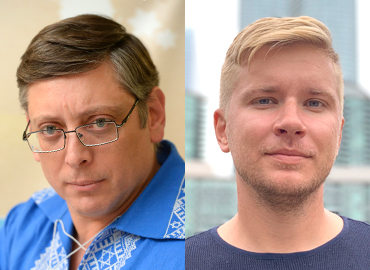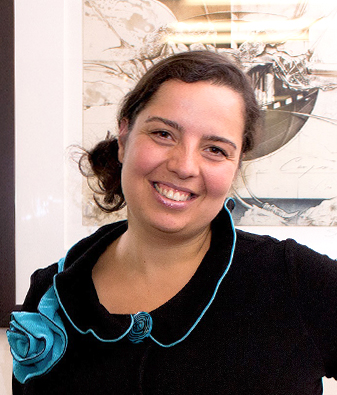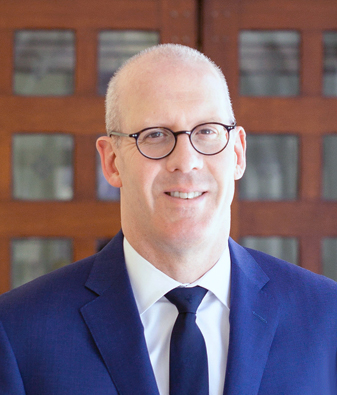When historian Igor Shchupak fled his hometown of Dnipro shortly after the Russian invasion of Ukraine in February of last year, he could take very little with him. But he did remember his laptop.
Anna Shternshis understood this perfectly. “He’s a scholar like me. And I’m thinking, if I had to run? That’s what I’d take too.”
Shchupak’s computer contained priceless historical testimony and archival material gathered from Ukrainian eyewitnesses to the Holocaust; now, safe in Toronto, he is transcribing his findings with a view to publishing them.
He’s one of several scholars who are now pursuing postdoctoral or graduate studies at U of T, thanks to emergency funding from the federal government’s Social Sciences & Humanities Research Council (SSHRC) — and to the efforts of his colleague Shternshis, Al and Malka Green Professor of Yiddish Studies and director of the Anne Tanenbaum Centre for Jewish Studies in the Faculty of Arts & Science.

“I’ve known Igor for a while, because we work in a similar field,” says Shternshis. “When he arrived in Toronto and needed help, I thought: what can I do?”
After combing Google for options, she was alerted to the SSHRC program by colleague Martin Pickavé, chair of the Department of Philosophy. It allows any SSHRC-funded professor to supervise the research of a Ukrainian scholar for one year. “The second I found out about it, I filled that form. Ten days later the permission came, and we were able to hire Igor as a postdoctoral fellow.”
Shternshis knew that many other scholars from Ukraine had also sought refuge in Toronto, and that they too could benefit.
“I’m a specialist in refugee studies and the Holocaust. I know that if a refugee finds a network of people who can help, or even one person, that can make a huge difference in how their life trajectory works out,” she says.
Shternshis contacted refugee scholars in an online community, asking them to approach her if they needed help finding placements. Flooded with requests, she then set about playing matchmaker. Communicating in Russian — her first language, and one that is easier for Ukrainians than English — she helped the scholars find professors on staff working in similar veins to their own. So far, she has placed a handful of scholars with expertise in areas as varied as history, the study of religion, philosophy, Slavic studies, river biology and others.
The goodwill on the part of faculty members was tremendous. And most importantly, academia is not losing these scholars, it’s keeping them. That’s very exciting.”
“The goodwill on the part of faculty members was tremendous,” she says. “And most importantly, academia is not losing these scholars, it’s keeping them. That’s very exciting.”
Shchupak is one such scholar. Since his undergraduate days in the early 1980s as the only known Jewish student in the academic group of his institute, he has been tireless in his efforts to preserve the history of Jews in Ukraine. In addition to writing dozens of history textbooks which are used in most schools in Ukraine, in 1999 he participated in the creation of Tkuma: the Ukrainian Institute for Holocaust Studies, which he still manages to this day. He is also a member of the Ukrainian-German and Ukrainian-Polish historical commissions, as well as the International Council of Auschwitz in Poland and the Ukrainian Jewish Encounter in Canada.
“The connections between the Holocaust and this new war are fascinating,” he says. “And many people in Ukraine now have a special interest in the Holocaust because they see that connection.”
Before the invasion, Shchupak organized an online competition in which primary students were invited to submit artwork or essays about the Holocaust. Ninety-nine per cent of entries were from non-Jews — an apparent rebuttal of Vladimir Putin’s depiction of Ukraine as a country animated by neo-Nazism.

On the contrary, says Shchupak, it is Putin who poses a deadly threat, not only to Ukraine but the world. “The Russian government is destroying our country and our language,” he says. “People should see the similarity between this war and World War II.”
One of the lessons of the earlier war is that refugees should not be turned away. Within a month of the February 2022 invasion, fully one quarter of Ukrainians had left their homes. One of them is Viacheslav Zahorodniuk, a postdoctoral philosophy student.
Soon after war broke out, Zahorodniuk fled Kyiv, only to find himself “sitting with my wife in the mountains, in the west of Ukraine. We were very isolated. I did not know what to expect from the future.”
Fortunately, a Ukrainian-born friend who was studying at U of T alerted him to Shternshis’ initiative. “He told me there was a professor here who is very big in my field, and there may be an opportunity to come.”
Today, Zahorodniuk is doing postdoctoral research on Scottish Enlightenment philosopher David Hume, who was the subject of his PhD thesis at the Taras Shevchenko National University of Kyiv. He’s working under the supervision of Donald Ainslie, a professor in the Department of Philosophy and an expert on Hume.
Getting used to Canadian academic culture has not always been easy: “For example, I didn’t have a clear idea of what a ‘postdoc’ was. In Ukraine, we don’t have that position,” he says. “But you know, I’m very grateful for everything. Professor Ainslie is a major figure in our field and I didn’t expect him to spend so much time with me. I feel I’m getting better after each meeting and each email; I feel myself motivated and doing more important things.”
It’s important to try and put yourself mentally in the place of refugees. So many people don’t know how it feels when you leave everything, come with nothing and don’t know what’s going to happen to you.

Ainslie sees his work with Zahorodniuk as a unique and important opportunity. “I think a lot of us share this sense that we owe it to the intellectual community to help each other in times of crisis,” he says. “The effect of this awful war on Ukrainian cultural life has been a disaster of the highest order, and all of us who are lucky enough to be in a safe situation in a place like Canada should be doing what we can to support our colleagues. So I was more than happy to do this.”
When he’s able to, Zahorodniuk plans to return to Ukraine — incorporating what he calls the “direct and clear” approach to philosophical inquiry that he’s found in Canada into the writing he intends to do. Though Ukraine has a strong sense of itself as a nation, it is still an emerging country whose fortunes have been shaped and intertwined by its proximity to neighbouring countries. “We have a lot of work ahead to formulate our national idea,” Zahorodniuk says. “This is why in Ukraine, philosophy will be very important in the coming years.”
Many Ukrainian refugees have come to Canada with their families, but some have come alone. One of these is Valeriya, who did not want her surname published. After Vladimir Putin annexed Crimea and occupied her home region of eastern Ukraine in 2014, her family was forced to move to the city of Bucha. Before the brutal civilian massacre that occurred there in March 2022, they fled to Poland. Ultimately, she made her way to Canada alone.
“I don’t have a house anymore,” she says. “I’m a refugee two times. I don’t know if I can go back.”
For now, Valeriya is living in Toronto and pursuing master’s degree studies in literature and economics. SSHRC funding is also allowing her to conduct research on topic such as religion and art under the supervision of Walid Saleh, a professor in the Department for the Study of Religion.
Because her field of inquiry is so wide-ranging, she is acutely conscious of the various ways in which the war in Ukraine is destructive. Worst of these is the loss of human life. But Valeriya is quick to sound a note of caution about its other catastrophic effects.
“Just because the war is far away doesn’t mean that we are all safe; this war will spread in different ways,” she says. She cites severe harm to the economy and environment, which “will snowball and become global. We don’t know what will happen in the future.”
For now, Valeriya continues to concentrate on her work, enduring the shock of displacement. While she is grateful for the collaborative nature of the research she’s doing at U of T, she thinks it’s important that people remain mindful of the grave situation in which she and her fellow Ukrainians remain.
We have never had so many Ukrainians from Ukraine here at U of T. And it’s important to say that this accommodation is not just a gift to them — it’s a gift to us. Because we benefit so much from what they have to share.
“It’s important to try and put yourself mentally in the place of refugees,” she says. “So many people don’t know how it feels when you leave everything, come with nothing and don’t know what’s going to happen to you.”
Anna Shternshis knows that the SSHRC funding arrangement cannot solve all the problems for Ukrainian refugee scholars in Canada. But apart from allowing them to extend their academic work, it does one very significant thing: it provides them with Canadian experience, a crucial commodity for any immigrant who may wish to stay here and seek employment in the country.
Now, Shternshis plans on securing mentorship for the scholars so they can write effective cover letters and CVs. She also applauds the presence of Ukrainian undergraduates in her classes, thanks to an agreement between the Faculty of Arts & Science and Ukraine’s National University of Kyiv-Mohyla Academy: since last year, this program has welcomed hundreds of students whose studies have been disrupted, to the University.
“We have never had so many Ukrainians from Ukraine here at U of T,” she notes. “And it’s important to say that this accommodation is not just a gift to them — it’s a gift to us. Because we benefit so much from what they have to share.”

